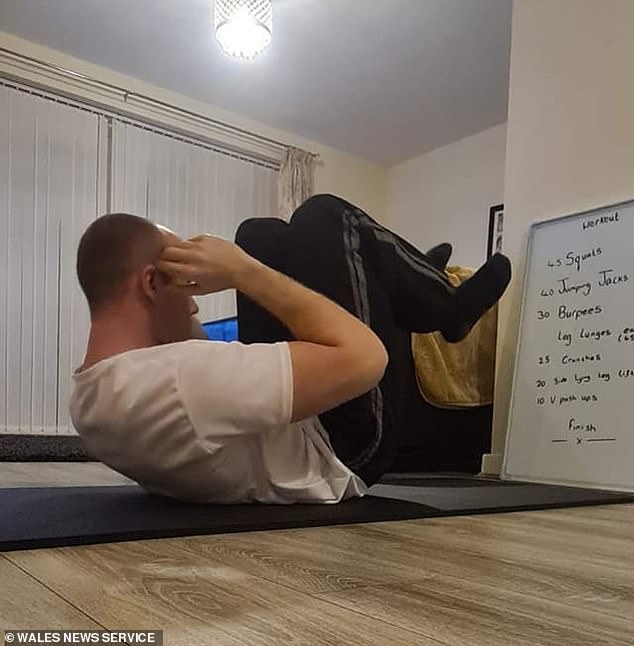Health officials have issued a stern warning against consuming high doses of caffeine supplements often taken to fuel workouts following the accidental death of a fit father.
Personal trainer Thomas Mansfield, 29, died of cardiac arrest in January 2021, just hours after drinking a concoction containing seven times the recommended daily dose of caffeine.
Minutes after drinking the supplement mix (which had the caffeine equivalent of 200 cups of coffee), he began “foaming at the mouth” and “clutching his chest.”
An investigation revealed Mr Mansfield, from Colwyn Bay, north Wales, had mistakenly taken almost 16 times the maximum recommended dose listed on the back of the packet.
Now the Food Standards Agency (FSA) has issued new warnings to consumers, urging them to take extra care and follow correct dosages.
Personal trainer Thomas Mansfield, 29, died of cardiac arrest in January 2021 just hours after drinking a concoction containing seven times the recommended daily dose of caffeine.
FSA chief scientific adviser Professor Robin May said: ‘While caffeine is found naturally in many food products, we have evidence that people are unaware of the higher levels of caffeine in some supplements and the risk this may pose.
‘Pure, highly concentrated caffeine supplements, such as caffeine powder, can be extremely potent.
‘Therefore, you should always follow the dosage instructions on the label and use suitable measuring equipment to ensure they are accurate.
‘If people experience side effects from caffeine, such as insomnia and agitation, they should consider how much caffeine they are getting from supplements in addition to other components of their diet.’
The agency added that it now recommends that pregnant women limit their daily caffeine intake to 200 mg. approximately two cups of instant coffee or one cup of filter coffee.
They should also check the label to see if there is a warning that the product may not be suitable.

Minutes after drinking the supplement mix, which was the caffeine equivalent of 200 cups of coffee, he began “foaming at the mouth” and “clutching his chest.”

An investigation revealed Mr Mansfield, from Colwyn Bay, north Wales, had mistakenly taken almost 16 times the maximum recommended dose listed on the back of the packet.
The FSA continued: “We are also reminding businesses of their responsibility to supply safe food and comply with food labelling and composition requirements, so that consumers have information to help them make informed choices about what they are eating.”
Caffeine comes in several different forms, including powders, gels, capsules and effervescent tablets, and is claimed to offer a quick energy boost.
Many products are aimed at gym-goers, labeled as “pre-workout” supplements that can improve endurance.
Mr Mansfield is said to have ordered his powder from supplements company Blackburn Distributions.
The recommended dosage of powder is 60 to 300 mg twice daily.
But the inquest into Mansfield’s death in 2022 revealed that her digital scales could only measure more than 2g – almost seven times the maximum dose.
The hearing was told Mr Mansfield was probably “aiming for a medium portion” but instead drank up to 5g of the powder.

The recommended dose of the powder is 60 to 300 mg twice a day. But the inquest into Mansfield’s death in 2022 revealed that her digital scales could only measure more than 2 g – almost seven times the maximum dose.
Within minutes of Mr. Mansfield calling an ambulance, Paramedics arrived and attempted to recalibrate his “abnormal” heart rhythm using a defibrillator.
He was rushed to Ysbyty Glan Clwyd Hospital after suffering a cardiac arrest, but was pronounced dead at 4pm on 5 January 2021.
An autopsy found he had 392 mg of caffeine per liter of blood, the equivalent of 200 cups of coffee.
The research concluded that death can be caused by levels of 78 mg per liter of blood or higher.
The medical cause of death was caffeine toxicity.
Senior coroner John Gittins recorded Mr Mansfield’s death as an accident due to the unintended result of consuming the caffeine powder.
She added that she had been “assured” that the brand had made arrangements to provide a measuring spoon and an A4 instruction sheet.
After his death, friends raised funds for the family, including Mansfield’s wife and children, Tommy and Millie.
Writing on social media, his wife Suzannah said she was “absolutely heartbroken” by the tragedy.
She said, “He was my whole life, I’ll never get over him. You were my life, Tom.”
‘I miss you so much and I’m trying so hard to keep the kids together. I love you more than I could ever love anyone. I will always love you.’
Mr Mansfield, who was self-employed, taught fitness classes through his personal training business and used the motto: “With you every step of the way.”

